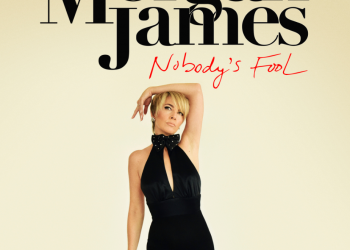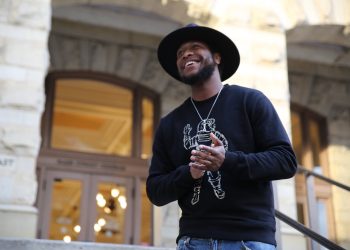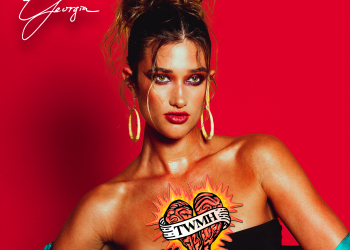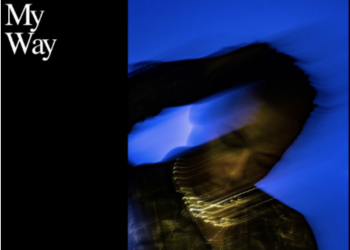Deitrick Haddon is a multi-talented gospel artist who strives to deliver a groundbreaking message in his music. The Detroit native adds a contemporary flavor to gospel music, which is why multitudes of fans gravitate to his music, which is labeled as “progressive gospel.” He created a sound that conjoins gospel and secular music, but it still highlights his unbreakable spirit and everlasting faith in God.
Haddon started off as a preacher at the Unity Cathedral of Faith in Detroit before he discovered music. He launched his solo career in the early 2000s when he released his first album, Lost &Found. Haddon’s debut album was No. 1 the Billboard Top Gospel Album Charts. Haddon released eight more albums, including his latest project, Masterpiece. He collaborated with rapper Big Boi on “Sinners (Saved By Grace),”
a song from the new album and the theme song for the Bounce TV series, Saints and Sinners.
Outside of singing, he is a pastor at the Hill City Church in Los Angeles and stars in the Oxygen Networks show, Preachers of LA. He is also the show’s executive producer, which demonstrates his creative input in entertainment.
The Gospel superstar and pastor conversed with Singersroom.com about the Bounce TV original series, his gratitude and appreciation for Christ, working with Big Boi, and reality television for a gospel artist.
Singersroom.com: What was it like working with the producers of the Bounce’s TV show, Saints and Sinners?
Deitrick Haddon: The show is very supportive of my music. The process was organic; they believed my song connects with the show’s theme. The producers allowed me to do God’s will and everything just fell into place.
SR: How did you come up with the theme song for the show?
DH: The song was from my Masterpiece album, and I did the remix with Big Boi. The concept for the song was basically being honest with my fans. You should give your testimony about your life in music as an artist. That’s the true meaning of music; releasing music that’s true to your heart. I remember one point in my life, I used to be filled with pride and lost my faith in God. But no matter what you’re going through, you never give up on God. You may experience a fall, go through trials and tribulations, but God will never give you too much you can’t handle in life. God is very compassionate, so he is very understanding about what you want and need in life. Sometimes we have to fall to get back up which is why it’s important for pastors not to judge people from their past mistakes. If you do that, more than likely, that individual is going to turn away from God. When someone judges a person, especially in church, it’s like pulling the trigger. You are killing the person before you meet with the Savior. And so when I made the record, I just wanted to be real and make music from the heart. You have to serve purpose in the darkness, so eventually, when you come out of it, you can share your light.
SR: What was it like working with Big Boi on the song?
DH: Ah, man it was organic. It was not forced at all. The president from eOne Music told me to check my email, and I realized another voice was added to the record. I was like I know that voice, which is why I thought it was Outkast at first. But, then I was like that’s Big Boi, he is on my record. Everything that Big Boi was saying on the record was real, true, and authentic. And the best part about Big Boi’s verse was him sharing his personal experiences growing up in the church.
SR: What made you decide to pursue a career in gospel music? Do you think gospel music is still traditional or versatile?
DH: At first, I landed an R&B production deal with Arista Records while I was living in Detroit. This was around the time when I was working with producers Tim & Bob. They also worked with Tony Rich on his project. They produced my album; it was like 20 songs for the album. It was like I was a choir director by day, and R&B singer at night. And at the time, gospel singers couldn’t sing about the Lord and love. But yet I couldn’t understand that concept because God is love. I was like you can still sing about love and serve God. And I said to myself, I didn’t want to be a traditional gospel artist who is restricted. I decided to add more flavor to my music and still deliver an inspirational message to people. I would say gospel music has a long way to go. Gospel artists should also sing about love or any other topics that are endearing to them. Church has to be open to change because music is constantly evolving and so is our generation. On my radio show, I did a late night segment, and I played only love songs from Jodeci, Guy, Luther, and other artists. I know when you’re making love to your lover or confess your love to someone, you don’t playing a church record. There’s a time and place for everything. There is nothing wrong with talking or singing about love. There is a chapter in the Bible, Songs of Solomon, that talks about love, so you can’t run away from it.
SR: How have you evolved as a pastor, singer, husband, and father?
DH: I had to learn more from my failures than victories. I had to learn how did I get to this place, and what can I learn from my past mistakes. I had to learn from all of the adversity I’ve been through so I can be a better person. I learned to be more compassionate for other people, but I am improving as a man every day. My perception of love stayed the same, but it’s important for me to build a foundation with your wife and children. I have a beautiful relationship with my wife Dominique and my children. My children are amazing. Fatherhood is important for me because my father was good to me and my other siblings. And it was important for me to follow the blueprint because I am a loving individual. I love hard; I am taking you to the bank when I tell someone that I love them. But I don’t tell people that I love them so quickly because you have to appreciate my love. When I look into my children’s eyes, it is important for me to love them unconditionally. My children are not judging me for my mistakes. they just want me to be there for them, and that’s love.
SR: What was it like working on the television projects, Fix My Choir and Preachers of LA?
DH On Fix My Choir: It was a creative process, and I was excited that I was a part of the project. Michelle is a great person to work with; she is truly the life of the party. It was a no brainer that I wanted her to the co-host of the show.
Preachers of LA: I had a conversation with Zachary Tims, a pastor about the direction that my life was going in at the time. It was just such a bad place for me, and it was on my heart to reach out to him. I started boohooing about leaving the church, my marriage failing; I just didn’t know what to do because everything was hitting the fan. But Zachary encouraged me to keep the faith, and he let me know that God is with me every step of the way. And that’s when I asked him about doing a reality show and his level of comfort. He was willing to do it, we got approved, and that’s how it all began. Zachary encouraged me to help and bless others while you’re bleeding.
SR: How do you handle all of the negative comments about preachers participating in reality TV?
DH: When I did the reality show, it wasn’t about making a profit. I mean it’s great that you’re getting paid for what you do on television. But it was an opportunity for myself and other pastors to reveal truth to the world about our lifestyles. I didn’t want the reality show to be full of drama and foolish behavior. It was all about changing the game as far as the ministry because this can be a platform to let people know that pastors are human, and we have ups and downs. But overall, these are a group of men who accepted their divine call from God. I wanted to flip the script and encourage people to watch the show.
SR: Let’s talk about your future projects.
DH: I am working on a film called Gospel According to To, and it focuses on the gospel music industry as far as the business side, the ups and downs, and just behind the scenes stuff once the lights go off. In the film, you will hear from other gospel artists, and they’re expressing their points of views about the industry. I am excited about this project because it gives people a chance to figure how and why gospel music has progressed throughout the years. The film shows how gospel has contributed greatness in our culture. I am also working on two television shows, but I am not allowed to mention the names of the projects yet. I am just excited to talk about the projects in depth in the near future. Outside of music, I am more behind the scenes as an executive producer and creator. I am also working on my ministry, my church, Hill City Church is in Los Angeles, and it’s another way to express my love for God to the church. The church website is hillcitylife.com. And if you live in LA or visiting, I encourage everyone to check the church out because my wife and I would be more than happy to have you attend.
![[EXCLUSIVE] Deitrick Haddon Talks ‘Saints & Sinners’ Theme Song, Reality TV, Evolution of Gospel Music, More](https://singersroom.com/wp-content/uploads/2016/04/deitrick-haddon.jpg)








